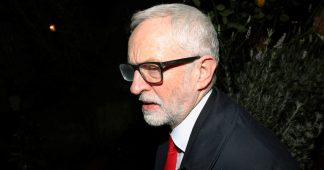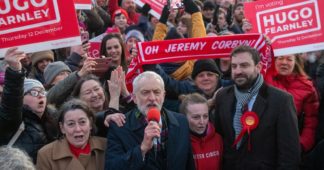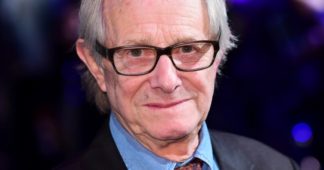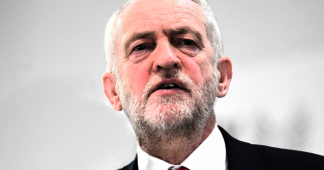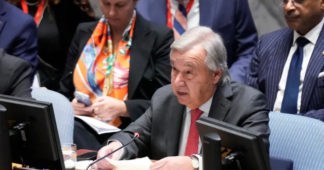Sumana Ramanan
Oct 22, 2023
MUMBAI: The United States’ sole veto of a United Nations Security Council resolution urging Israel to pause its assault on Gaza to allow humanitarian aid to the Palestinian enclave was “outrageous”, Jeremy Corbyn said on Friday at a meeting in Mumbai.
“I’ve been in Israel, Gaza, West Bank on nine occasions,” said Corbyn, an icon for the left despite being side lined by the Labour Party. He was talking at a small gathering organised by the Progressive International, an umbrella of left-wing organisations across the world, of which the former Labour Party chief is a board member. “Every time I go [I] come back more depressed…about the severity of the occupation, about the roadblocks, about the imprisonment, about the killing that goes on, and now the horror story of what is going on in Gaza. There has to be an immediate ceasefire,” Corbyn said.
“That’s why we’ve all got to speak out on this and support the Palestinian people,” he said. “How many more people are going to die in this appalling conflict? Sometimes, yes, it’s a bit lonely speaking out. But that’s what you have to do. That’s what brings about change.”
Corbyn, 74, was in Mumbai last week to attend a youth conference and board meeting of the International Transport Workers’ Federation which organises airline, dock, and railway workers, seafarers, taxi drivers and all kinds of transport workers all over the world through national unions. While in Mumbai he also met Congress leader Shashi Tharoor and Prakash Ambedkar of Vanchit Bahujan Aghadi.
“International trade unionism has to be a very important part of the counterbalance to the power of global corporations,” he said. “They [the corporations] are not going to disappear any time soon, but collectively we can close down the tax havens, collectively we can organise for better working conditions, collectively we can clip their wings a great deal.”
The meeting attracted about 150 people, including many activists, intellectuals and writers like Anand Teltumbde and Meena Kandasamy. The nearly two-hour session began with a short interview of Corbyn by Varsha Gandikota-Nellutla, the Delhi-based co-general coordinator of Progressive International, with audience members asking questions in the remaining time. A common thread in Corbyn’s answers was the need for internationalism, for people across the world to come together to tackle urgent problems.
One audience member asked why working people who fear job losses and declining living standards are falling prey in their respective countries to versions of ethno-nationalism, whose proponents blame the common person’s woes not on economic forces but on minorities and migrants. “Why are people not banding together across borders to resist the increasing centralisation of wealth and power, especially in the hands of a few technology companies?”
“The atmosphere in the United States…and Western Europe against migrants is appalling,” Corbyn replied. “People who are victims of war, [from] Afghanistan, Iraq, Syria, Libya, Sudan…are being blamed for the economic malaise of countries they have nothing to do with. [The migrant is] a convenient whipping boy, in exactly the same way the Nazis in the 1920s blamed the Jewish people…as the causes of all of the woes of the Weimar Republic.”
“It’s a very dangerous politics where you single out an ethnic, religious, linguistic minority and say that they’re the cause of all the problems,” Corbyn said. “It is a question of having the ability to educate your population about their history…[and] to respect one another.”
With respect to education, another audience member asked whether the global assault on humanities education in the name of keeping people abreast of technological advancement has led to most people having no historical sense, and ultimately falling prey to ethnonationalism.
“I don’t want to stop people training in specific areas, but we have to improve the quality and understanding of global history teaching in our schools all over the world,” Corby replied.
“We have to improve the study of social issues so that whatever you are studying… there is a social and humanities dimension to what you do.”
“Otherwise, [we] bring up people who have no knowledge of how things happened, of how things came about, [such as] the abuse of colonial power in India, in the Caribbean, in Africa, how the slave trade come about, what happened to the slave trade, how was it abolished…”
Many of Corbyn’s ideas will find their way into a book that he is in the last stages of writing. In the book, tentatively titled Life’s Rich Tapestry, he writes about his experience of being the Labour leader for five years, how he came to that position and his vision for the way ahead.
We remind our readers that publication of articles on our site does not mean that we agree with what is written. Our policy is to publish anything which we consider of interest, so as to assist our readers in forming their opinions. Sometimes we even publish articles with which we totally disagree, since we believe it is important for our readers to be informed on as wide a spectrum of views as possible.
